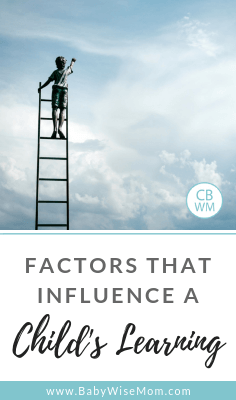Factors that Influence a Child’s Learning. Four factors that will impact how and what your child learns. Teach your little one well.

“There are many factors that influence learning, both positively and negatively. The child’s temperament, the presence or absence of siblings, parental resolve, the purpose for training, the method of instruction, and reinforcement are some of the more obvious ones” (On Becoming Babywise II, page 27).
Post Contents
Factors That Influence a Child’s Learning
As you sit and ponder this quote from Babywise II, the gravity of it can really hit you hard. Think of all of the things that affect your child’s personality. Some of it, like temperament, is out of your hands, but all of it can be influenced by you as the parent. It is your responsibility as the parent to guide your child through the learning process.
Natural Temperament
Take the child’s temperament. I think of Brayden and his immediate frustration upon not getting something perfectly. This has an effect on his learning.
There are things that have helped him through this frustration hurdle. One is independent playtime. When he is playing alone, he has no choice but to solve problems on his own, and having a fit about it doesn’t help him at all. It didn’t take him long after starting independent playtime before he was much more patient about working things out on his own.
Another thing that has helped is my voice. When he tries something and it is frustrating for him, I say, “Keep trying!” in a chipper way. He will take a deep breath and continue to try until he gets it. Upon this accomplishment, his face glows with satisfaction. He, in turn, has told me to keep trying when I have struggled to do something like open a jar.
Brayden also has the quality of being a really hard worker. Once he starts at something, he does not stop until the job is done. He won’t even pause for breaks when I do (which happens often during pregnancy). This is an excellent quality in his temperament that helps him along the learning process.
Kaitlyn also has temperament qualities that influence her learning. She has unending patience. She does not get frustrated and concentrates to get it right. At times she will ask for help, but always in a calm way. I always tell her to keep trying, also, and she will go back to it and accomplish it on her own.

Kaitlyn is a rather imaginative person who is relaxed and can get distracted while learning how to do something, focusing on something else. Independent playtime is something that has helped in this situation because it has helped her have excellent focusing skills. She has a long attention span (you can see there are many benefits to independent playtime ). Her tendency to get distracted easily has never been an issue to date. She has had independent play from basically birth (some version of it). I am just able to see this tendency in her.
And for better or worse, she is a sponge. It takes her literally one time of seeing something done or hearing something said for her to be able to repeat it flawlessly. Everything she is exposed to is imprinted in her mind.
Siblings
Having siblings is something I find so interesting as an influence in the learning process. There are things that were negative about Brayden spending a couple of years as an only child. One is that he didn’t have to wait while his parents attended to another sibling. Another is he didn’t have to share on a regular basis. The first time a child took a toy from him, he was in utter shock. No one had treated him that way before.
There are also positive things about him being an only child for two years. All of my focus and energy was on helping him grow to be the best he could be. He had a lot of one-on-one time with his parents.
I see a huge influence of Brayden on Kaitlyn. We often call her “B2” because she can be a little Brayden clone. She wants to be just like him. She plays with the toys he plays with, she gets excited over the things he gets excited about, and she responds to situations the same way he does oftentimes.
Birth Order
In The Birth Order Book, Leman talks about the influences on children. For the oldest, the parents are the greatest influence, which is why the oldest are often mature for their age and often enjoy the company of adults over the company of their peers. For all younger siblings, the greatest influence is the sibling just older.
Kaitlyn has been able to learn to share from a young age. She has had to patiently wait her turn for her entire life. She watches her brother learn and is determined to know what he knows. She is also determined to do what he does, resulting in her trying to accomplish physical tasks her body just isn’t equipped for. Fortunately, she has enough caution within her that she has never gotten hurt (and it doesn’t hurt that Brayden is ridiculously cautious!).
In the end, someone has to be an only child for a period. Someone has to be the oldest, the youngest, and possibly the middle. Each brings with it positive and negatives. As parents, we can do our best to highlight the positives and mediate the negatives. For more on birth order, see birth order .
Parental Resolve
Parental resolve is another influence listed in Babywise II. How much time are you willing to dedicate to teaching your children? We aren’t talking simple academic skills here. We are talking basic skills (motor skills like walking), academic learning, and moral learning.
How consistent are you in these areas? How much do you provide opportunities to learn? This is not intended to make you feel guilty. Just realize that you have a huge impact on the physical, academic, and moral education of your children. Always keep the purpose in mind so you don’t get stuck in tunnel vision.
There are many different ways to teach and learn things. Don’t decide one way is best and ignore the signs from your child that it isn’t working. Always remember why vs. how . Find the types of reinforcement that work for your child and use them.
Can you influence the physical skills your child attains? Yes, and no. No, because your child will reach these milestones when his body is ready for them, despite your pushing. He will walk when he is ready to walk, talk when he is ready to talk, master the spoon when his muscles are ready for it…Worrying and pressuring won’t speed the process.
Even so, you can provide opportunities for learning. Give him time and opportunities to practice walking–don’t keep him cooped up all day. Read books to him and talk to him so he has exposure to words. Let him practice with the spoon. But always remember to do these things as your baby is ready for it. Keep the funnel in mind and encourage when your baby is ready.
You can similarly influence academic learning. Remember learning is progressive; don’t expect your child to read before he can say the ABCs. Be willing to read the same book, sing the same songs, and explain the same concept over and over (and over). Plan some time in your day for this academic learning–but certainly, don’t make it the focus of the entire day.
And you also have an influence on moral training. Your example is huge, as are your expectations. Moral training is so big as to be its own post, so see this label for moral training information, and expect more to come: moral training
Conclusion
What our children do all day and who they spend time with have a huge impact on who they become. While we are not necessarily always in the “teaching” mode, our children are always in the “learning” mode. Be mindful of the influences on your child’s learning so you can optimize the opportunities before you.


Hi Val, I really appreciated this post. I’ve been thinking alot lately about my 10 month old’s attention span. We do independent play time in the play pen for at least 30 mins. a day. I put 3 or 4 toys in there for him and then leave the room. However, he will bounce back and forth from toy to toy the entire time. He never spends more than 5 minutes with one toy. It’s like he rotates through them and plays with each one for a few minutes several times. Should I be concerned about this? Is there anything else I can do to help help him focus more? Thanks for your advice!
This question has nothing to do with learning but are there any workig moms out there that have problems with their BW babies napping at home for them? Our daughter goes to a sitter 2 days and her grandmother’s 2 days and she naps perfectly for them. Better at the gmother’s house I suspect b/c there is not as much going on there for her to want to wake up and do. When she is at home with me the other 3 days a week though she doesn’t sleep more than 45 minutes. Her 4 days of naps a week are two 2 hour naps. and she does them just fine. I don’t know how or why it happened – but I suspect that she misses me during the week (I only see her hour a day during the week b/c of work/bedtime hours) and wants to play when she is home with me. i am up for suggestions and guidance. PLEASE!
Janelle,At this age, I wouldn’t worry about that. It doesn’t sound like you have an excessive amount of toys in there for him. He will improve with time. If it is something that concerns you, you can use structured playtime to try to lengthen attention span. You can have him sit in his highchair and give him a toy or activity. You stay in the room with him. You can then set the timer and have him play with it until the timer goes off. If you do this, start with 5 minutes and work up. See the blog label “structured playtime” for more about this activity.
Janelle, thanks for the thanks by the way 🙂
Traveling Turtle, I don’t have personal experience here. I have heard of many working moms having napping problems at home, but I think they are typically problems that stem from the actual daycare.I think your hypothesis could be right; she is waking to spend time with you. If so, I don’t know that there is anything you can do about it. Before you jump to that conclusion, I would sit and write down all possible differences at home vs. sitter’s. How is the lighting comparable? Noises? Waketime lengths? etc. Think through it all. Then try to make things as similar to the sitter’s as possible. See what happens. If she is still waking, you might conclude that your hypothesis was right.
it helped me so much with college assignment 🙂 thankyou!